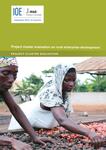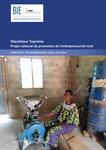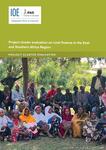Page Header
Agricultural Rehabilitation Programme in Orientale Province
Overview
The Agricultural Rehabilitation Programme in Orientale Province in the Democratic Republic of the Congo was implemented in a context of serious hardship. It took strategic measures that had rapid impact on agricultural production and food security, and human and social capital. Actions included improving road access, creating grass-roots organizations, distributing agricultural and fisheries tools and inputs, and rehabilitating social infrastructure. The programme contributed to reviving the agricultural economy and instilling a participatory local development dynamic in the programme area. However, the highly challenging implementation context was not sufficiently taken into account in the overly ambitious and complex programme design, and the programme team's planning and management capacity was not commensurate to the challenges. Consequently, programme efficiency was low with important implementation delays and very high operating costs, which only improved towards the end. In addition, sustainability of impact is at risk because of the weak maturity of producers' organizations and limited capacity of public and private service providers. Programme performance and impact could have been much higher, had the programme had more realistic objectives and geographical coverage, and more appropriate duration and phasing; had it given more attention to capacity building among community-based organizations and deconcentrated government services; and had it better integrated marketing and environmental aspects to reduce risks related to overproduction, environmental degradation and climate change.Report Details
| Year Published | |
| Type | |
| Joint | No |
| Partner/s | N/A |
| Consultant name | Majid Benabdellah |
| Agency Focal Point | Michael Carbon |
| Focal Point Email | m.carbon@ifad.org |
| Managed by Independent Evaluation Office | Yes |
| Country/ies |
YOU 'RE READING
Agricultural Rehabilitation Programme in Orientale Province











